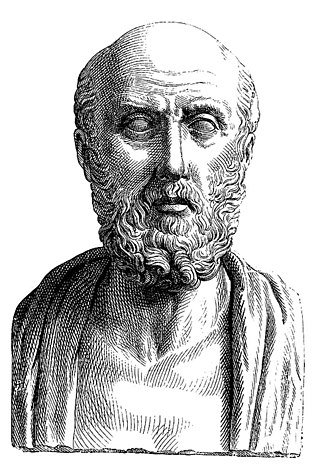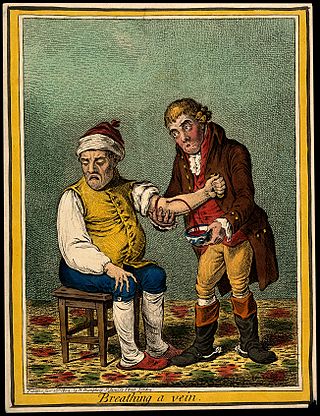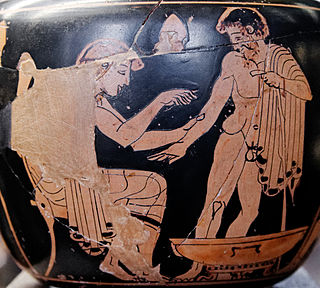Related Research Articles

Hippocrates of Kos, also known as Hippocrates II, was a Greek physician of the classical period who is considered one of the most outstanding figures in the history of medicine. He is traditionally referred to as the "Father of Medicine" in recognition of his lasting contributions to the field, such as the use of prognosis and clinical observation, the systematic categorization of diseases, or the formulation of humoral theory. The Hippocratic school of medicine revolutionized ancient Greek medicine, establishing it as a discipline distinct from other fields with which it had traditionally been associated, thus establishing medicine as a profession.

The history of medicine is both a study of medicine throughout history as well as a multidisciplinary field of study that seeks to explore and understand medical practices, both past and present, throughout human societies.

The Hippocratic Oath is an oath of ethics historically taken by physicians. It is one of the most widely known of Greek medical texts. In its original form, it requires a new physician to swear, by a number of healing gods, to uphold specific ethical standards. The oath is the earliest expression of medical ethics in the Western world, establishing several principles of medical ethics which remain of paramount significance today. These include the principles of medical confidentiality and non-maleficence. As the seminal articulation of certain principles that continue to guide and inform medical practice, the ancient text is of more than historic and symbolic value. It is enshrined in the legal statutes of various jurisdictions, such that violations of the oath may carry criminal or other liability beyond the oath's symbolic nature.
Marilyn Hacker is an American poet, translator and critic. She is Professor of English emerita at the City College of New York.

Heroic medicine, also referred to as heroic depletion theory, was a therapeutic method advocating for rigorous treatment of bloodletting, purging, and sweating to shock the body back to health after an illness caused by a humoral imbalance. Rising to the front of orthodox medical practice in the "Age of Heroic Medicine" (1780–1850), it fell out of favor in the mid-19th century as gentler treatments were shown to be more effective and the idea of palliative treatment began to develop.

The Hippocratic Corpus, or Hippocratic Collection, is a collection of around 60 early Ancient Greek medical works strongly associated with the physician Hippocrates and his teachings. The Hippocratic Corpus covers many diverse aspects of medicine, from Hippocrates' medical theories to what he devised to be ethical means of medical practice, to addressing various illnesses. Even though it is considered a singular corpus that represents Hippocratic medicine, they vary in content, age, style, methods, and views practiced; therefore, authorship is largely unknown. Hippocrates began Western society's development of medicine, through a delicate blending of the art of healing and scientific observations. What Hippocrates was sharing from within his collection of works was not only how to identify symptoms of disease and proper diagnostic practices, but more essentially, he was alluding to his personable form of art, "The art of true living and the art of fine medicine combined." The Hippocratic Corpus became the foundation upon which Western medical practice was built.

Paul Edward Farmer was an American medical anthropologist and physician. Farmer held an MD and PhD from Harvard University, where he was a University Professor and the chair of the Department of Global Health and Social Medicine at Harvard Medical School. He was the co-founder and chief strategist of Partners In Health (PIH), an international non-profit organization that since 1987 has provided direct health care services and undertaken research and advocacy activities on behalf of those who are sick and living in poverty. He was professor of medicine and chief of the Division of Global Health Equity at Brigham and Women’s Hospital.

In the history of medicine, "Islamic medicine" is the science of medicine developed in the Middle East, and usually written in Arabic, the lingua franca of Islamic civilization.

Ancient Greek medicine was a compilation of theories and practices that were constantly expanding through new ideologies and trials. The Greek term for medicine was iatrikē. Many components were considered in ancient Greek medicine, intertwining the spiritual with the physical. Specifically, the ancient Greeks believed health was affected by the humors, geographic location, social class, diet, trauma, beliefs, and mindset. Early on the ancient Greeks believed that illnesses were "divine punishments" and that healing was a "gift from the Gods". As trials continued wherein theories were tested against symptoms and results, the pure spiritual beliefs regarding "punishments" and "gifts" were replaced with a foundation based in the physical, i.e., cause and effect.
Asclepiad was a title borne by many Ancient Greek medical doctors, notably Hippocrates of Kos. It is not clear whether the Asclepiads were originally a biological family, or simply a member of an order or guild of doctors.

Medicine in ancient Rome was highly influenced by ancient Greek medicine, but also developed new practices through knowledge of the Hippocratic Corpus combined with use of the treatment of diet, regimen, along with surgical procedures. This was most notably seen through the works of two of the prominent Greek physicians, Dioscorides and Galen, who practiced medicine and recorded their discoveries. This is contrary to two other physicians like Soranus of Ephesus and Asclepiades of Bithynia, who practiced medicine both in outside territories and in ancient Roman territory, subsequently. Dioscorides was a Roman army physician, Soranus was a representative for the Methodic school of medicine, Galen performed public demonstrations, and Asclepiades was a leading Roman physician. These four physicians all had knowledge of medicine, ailments, and treatments that were healing, long lasting and influential to human history.

Narrative Medicine is the discipline of applying the skills used in analyzing literature to interviewing patients. The premise of narrative medicine is that how a patient speaks about his or her illness or complaint is analogous to how literature offers a plot with characters and is filled with metaphors, and that becoming conversant with the elements of literature facilitates understanding the stories that patients bring. Narrative Medicine is a diagnostic and comprehensive approach that utilizes patients' narratives in clinical practice, research, and education to promote healing. Beyond attempts to reach accurate diagnoses, it aims to address the relational and psychological dimensions that occur in tandem with physical illness. Narrative medicine aims not only to validate the experience of the patient, it also encourages creativity and self-reflection in the physician.
Michael Salcman is an American poet and physician who lives in Baltimore, Maryland. His poetical work is infused and vivified by his medical profession, his love of and expertise in contemporary art, and by the fact that his parents were Holocaust survivors. His work is characterized by a lushness of diction, a strong moral focus, and a sense of playful imagery.
Physician writers are physicians who write creatively in fields outside their practice of medicine.
Duke University Hospital is a 957-bed acute care facility and an academic tertiary care facility located in Durham, North Carolina. Established in 1930, it is the flagship teaching hospital for the Duke University Health System, a network of physicians and hospitals serving Durham County and Wake County, North Carolina, and surrounding areas, as well as one of three Level I referral centers for the Research Triangle of North Carolina. It is affiliated with the Duke University School of Medicine.
Cecil Helman was a South African doctor, author, and medical anthropologist. He published poetry, essays, and short stories, as well as academic books and papers.
Healing Words: Poetry and Medicine is a sixty-minute documentary (ISBN 978-0-7936-9468-6) filmed in 2008 primarily at Shands at the University of Florida. The production portrays individuals in personal quest to recover psychologically and physically from illnesses that have dramatically changed their lives. This film validates expressive art in medical settings can build doctor–patient relationships and be a supportive companion in the healing process.
Donald Robert James Singer was a British clinical pharmacologist who was the president of the Fellowship of Postgraduate Medicine.

The Hippocrates Prize for Poetry and Medicine was founded in 2009 by Donald Singer and Michael Hulse. The founders "wished to draw together national and international perspectives on three major historical and contemporary themes uniting the disciplines of poetry and medicine: medicine as inspiration for the writings of poets; effects of poetic creativity on the experience of illness by patients, their families, friends, and carers; and poetry as therapy".
Modern understanding of disease is very different from the way it was understood in ancient Greece and Rome. The way modern physicians approach healing of the sick differs greatly from the methods used by early general healers or elite physicians like Hippocrates or Galen. In modern medicine, the understanding of disease stems from the "germ theory of disease", a concept that emerged in the second half of the 19th century, such that a disease is the result of an invasion of a micro-organism into a living host. Therefore, when a person becomes ill, modern treatments "target" the specific pathogen or bacterium in order to "beat" or "kill" the disease.
References
- 1 2 3 4 5 6 Fitzpatrick, Chris (18 April 2022). "Poetry is powerful healer for both medic and patient". The Irish Times. ProQuest 2651395782.
- ↑ "GLBTQ >> social sciences >> Latina/Latino Americans". Archived from the original on 2006-10-18. Retrieved 2006-10-04.
- ↑ "Poet, physician Rafael Campo to read from work: 1/01". www.stanford.edu. Archived from the original on 7 July 2001. Retrieved 6 June 2022.
- ↑ "About Rafael Campo | Academy of American Poets".
- ↑ "AIDS - Joseph Hallman, Composer". Archived from the original on 2016-03-04. Retrieved 2014-12-01.
- ↑ "Brown Paper Tickets - the fair-trade ticketing company".
- ↑ "Harvard poet and physician Rafael Campo wins Hippocrates Open International Prize for Poetry and Medicine | Hippocrates Initiative for Poetry and Medicine | Donald RJ Singer".
- ↑ "Rafael Campo - John Simon Guggenheim Memorial Foundation". Archived from the original on 2012-09-23. Retrieved 2011-06-29.